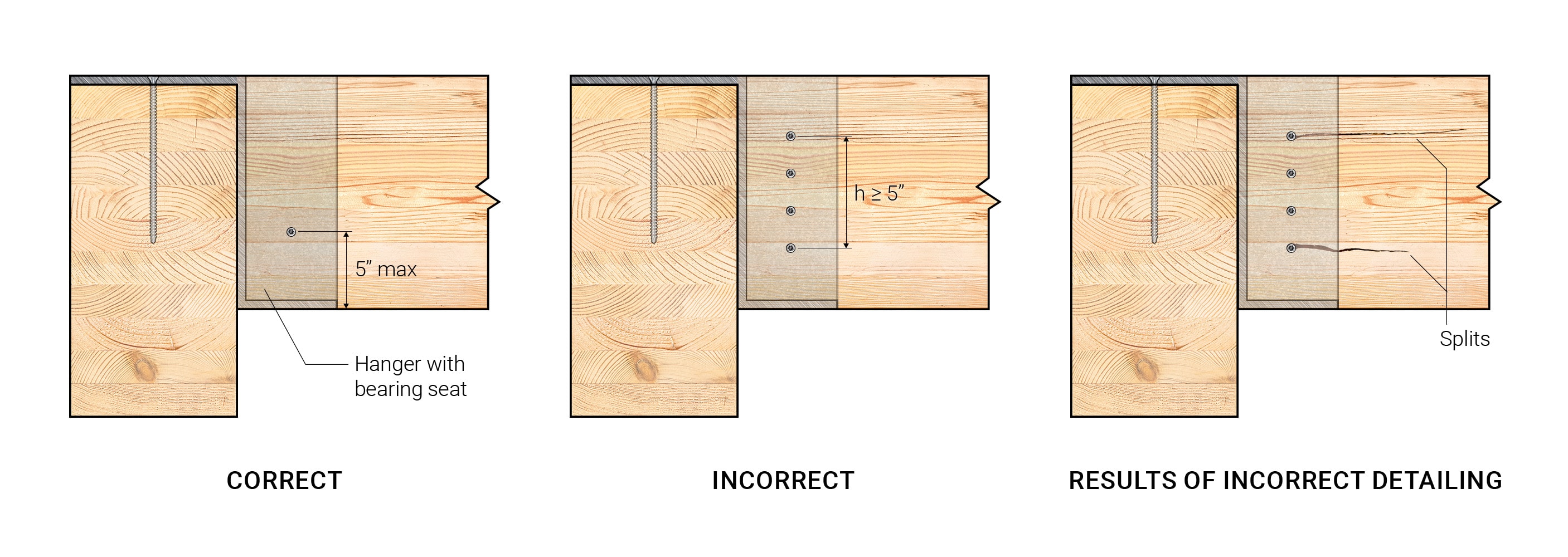Stresses arising from the natural shrinkage and swelling of wood in response to periodic changes in ambient moisture levels may pose a considerable threat to the performance and safety of mass timber structures. This concern is particularly pronounced in areas where wood and metal components are integrated as is the case with connections in modern mass timber structures, highlighting the necessity of special detailing considerations during the design phase to mitigate potential risks to the structural integrity of the wood connections.
Approximately a 5-minute read
Hygroscopicity of Wood
The distinctive hygroscopic nature of wood, setting it apart from materials like steel, involves a response to moisture in the environment, equilibrating to the ambient condition, otherwise known as the equilibrium moisture content (EMC). Remarkably, the resulting volumetric changes in wood, most apparent in the perpendicular-to-grain directions, can generate substantial stress on elements constraining its movement. Our white paper “Timber Moisture Content Changes and Associated Stress Predictions on Structural Wood Screws” demonstrates through a simplified model that even a slight increase in wood moisture content (MC) from 12% to 13% can potentially yield stresses exceeding 30 MPa based on the boundary conditions presented in the example.
Throughout history, the hygroscopic properties of wood have been exploited for various purposes. One notable example is the use of wooden wedges across civilizations for breaking stone. The significant pressure generated by wood from the addition of water facilitated the builders to split stones used in construction and other large works.
Impact of Wood Swelling and Shrinkage on Structural Integrity
Moisture changes in wood, influenced by changing ambient conditions, can potentially jeopardize the performance of connections in mass timber structures through resulting stresses on connector components, warranting careful design considerations.
In wood-to-wood applications, moisture-induced stresses do not generally pose challenges, largely due to the synchronous response of wood components to ambient moisture levels. While moisture changes can still create localized stresses around fasteners, these stresses tend to dissipate over time as the wood naturally relaxes and responds.
Conversely, steel elements in steel-to-wood connections appreciably amplify induced stresses resulting from moisture changes due to the restraints they impose on the otherwise free movement of wood. This phenomenon stems from the inherent property of steel and other metallic elements to maintain a consistent volume, regardless of any periodic changes in ambient humidity, in contrast to wood.
This issue is exemplified in a steel-to-wood assembly when insertion and seating torque are not controlled for the installation of self-tapping screws. During an uncontrolled installation, the specified seating torque at the steel plate may be exceeded, resulting in undesired pre-tensioning of screws. As the wood member swells to reach EMC (e.g., in a construction setting), stresses produced from the steel plate’s restraint against the wood’s volumetric change generate additional axial forces on the screws. If the combination of the induced stresses, the pre-tensioning forces, and the intended axial force exceeds the tensile capacity of the steel material, the screw will fracture.
In cases where shrinkage is expected, a partially threaded screw may be used in place of a fully threaded screw, provided that the design permits such a substitution. In this scenario, it is advisable that the threads of the partially threaded screw are embedded only into the main member, so that the unthreaded shank in the side member may move freely. In contrast, a fully threaded screw would restrict free movement and direct the newly resultant axial stresses to itself.
Codified Provisions
A common rule of thumb is the assumption of a 0.25% change in volume per 1% change in EMC. This means that with a change in EMC from 10% to 14%, roughly a 1% change in volume is expected perpendicular to the grain.
To address this issue, design standards have included specific provisions. For instance, the National Design Standard for Wood Construction (NDS) prescribes a maximum perpendicular-to-grain distance of 5” for outermost fasteners in steel splice plates in the absence of special detailing considerations for cross-grain shrinkage. Similarly, the CSA O86 Engineering Design in Wood mandates a maximum distance of 125 mm. Failure to follow these provisions generally results in splitting at the outermost screws due to greater restraint against cross-grain shrinkage, as shown below.

Special detailing should be implemented to accommodate the volumetric changes in wood, particularly for steel-to-wood assemblies. For more information and design guidance, please contact our Technical Support Team. 🙂
Register for a Technical Learning Session
Sign up for MTC Newsletter and keep up to date with all our progress.